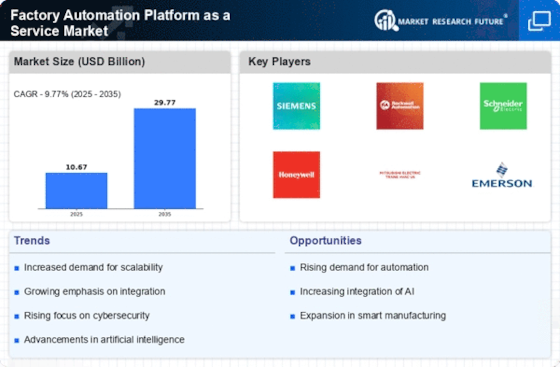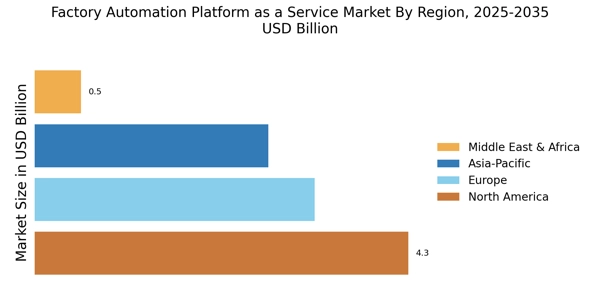Integration of Advanced Technologies
The integration of advanced technologies is a pivotal driver in the Factory Automation Platform as a Service Market. Technologies such as artificial intelligence, machine learning, and the Internet of Things are increasingly being incorporated into automation solutions. This integration enhances the capabilities of factory automation platforms, allowing for predictive maintenance, improved quality control, and enhanced data analytics. For instance, the use of AI algorithms can lead to a reduction in operational costs by up to 20%. As manufacturers seek to leverage these technologies to gain a competitive edge, the demand for sophisticated automation platforms is expected to rise. This trend indicates a shift towards more intelligent and adaptive manufacturing processes, further propelling the growth of the Factory Automation Platform as a Service Market.
Growing Focus on Supply Chain Resilience
The Factory Automation Platform as a Service Market is witnessing a growing focus on supply chain resilience. In an increasingly interconnected world, disruptions in supply chains can have significant repercussions for manufacturers. As a result, companies are investing in automation solutions that enhance visibility and control over their supply chains. By utilizing factory automation platforms, organizations can achieve better inventory management, demand forecasting, and logistics optimization. Recent studies suggest that companies that adopt such platforms can improve their supply chain efficiency by as much as 25%. This emphasis on resilience is likely to drive the adoption of factory automation solutions, as businesses seek to mitigate risks and ensure continuity in their operations.
Rising Demand for Operational Efficiency
The Factory Automation Platform as a Service Market is experiencing a notable surge in demand for operational efficiency. Organizations are increasingly seeking solutions that streamline processes, reduce downtime, and enhance productivity. According to recent data, companies that implement automation solutions can achieve efficiency gains of up to 30%. This trend is driven by the need to remain competitive in a rapidly evolving market landscape. As businesses strive to optimize their operations, the adoption of factory automation platforms becomes essential. These platforms facilitate real-time monitoring and control, enabling organizations to respond swiftly to changing conditions. Consequently, the Factory Automation Platform as a Service Market is poised for growth as more enterprises recognize the value of operational efficiency in achieving their strategic objectives.
Regulatory Compliance and Safety Standards
Regulatory compliance and safety standards are becoming increasingly stringent, driving the Factory Automation Platform as a Service Market. Manufacturers are required to adhere to various regulations concerning safety, quality, and environmental impact. Automation platforms can assist organizations in meeting these compliance requirements by providing real-time monitoring and reporting capabilities. For example, platforms can track emissions and energy consumption, ensuring that companies remain within regulatory limits. This capability not only helps in compliance but also enhances overall operational safety. As the regulatory landscape continues to evolve, the demand for factory automation solutions that facilitate compliance is expected to grow, further fueling the expansion of the Factory Automation Platform as a Service Market.
Shift Towards Customization and Flexibility
The shift towards customization and flexibility is a significant driver in the Factory Automation Platform as a Service Market. As consumer preferences evolve, manufacturers are increasingly required to produce customized products at scale. This demand necessitates flexible manufacturing systems that can adapt to changing requirements. Factory automation platforms enable this flexibility by allowing for rapid reconfiguration of production lines and processes. Data indicates that companies that implement flexible automation solutions can reduce lead times by up to 40%. This adaptability not only enhances customer satisfaction but also improves overall operational efficiency. As the market continues to evolve, the emphasis on customization is likely to drive further adoption of factory automation platforms, solidifying their role in the Factory Automation Platform as a Service Market.

















